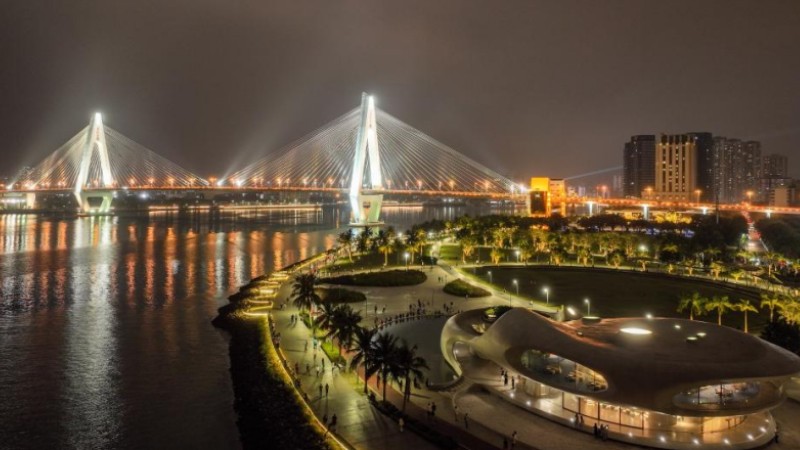How Washington uses "proxies" to instigate "color revolution" in Venezuela?
CARACAS, April 9 (Xinhua) -- At the first "Summit for Democracy" held by the United States in December 2021, Venezuelan opposition leader Juan Guaido was invited to speak online as a self-proclaimed "interim president."
Just over a year later, however, Guaido was no longer in the limelight because he had been ditched by Washington as a worthless pawn.
"A GUEST OF HONOR"
On the evening of Feb. 4, 2020, Guaido attended the State of the Union address by then U.S. President Donald Trump, who introduced Guaido as Venezuela's "true and legitimate" leader. The following day, Guaido met with Trump at the White House, and photos of them in the Oval Office made headlines.
Born in 1983 in La Guaira in Venezuela, Guaido obtained a degree in industrial engineering from the Andres Bello Catholic University in 2007. In 2009, Guaido helped found the Popular Will party. He was sworn in as president of the opposition-controlled National Assembly of Venezuela on Jan. 5, 2019.
In May 2018, Nicolas Maduro was re-elected in Venezuela's presidential election. However, under the pretext of "democracy" and "human rights," the United States, together with its allies and Venezuela's opposition, refused to recognize the legitimacy of Maduro's government. On Jan. 23, 2019, Guaido declared himself the "interim president" of Venezuela. On the same day, the United States announced its recognition of Guaido and expressed support for him. Maduro immediately announced that Venezuela severed its diplomatic relations with the United States.
While financing Guaido, the United States has attempted to pressure Maduro to step down through diplomatic isolation, economic sanctions and military threats. Under American pressure, more than 50 countries and the European Union recognized Guaido as the so-called "legitimate president."
In fact, Washington's search for "proxies" like Guaido began early. As disclosed by the Fact Sheet on the National Endowment for Democracy (NED) released by the Chinese Ministry of Foreign Affairs last year, after Hugo Chavez, the "anti-U.S. fighter," was elected president of Venezuela in 1999, NED accelerated its behind-the-scenes operations.
It provided continuous funding to the Venezuelan opposition and invited people to "training courses" in the United States. In 2005, Guaido and four other Venezuelan "student leaders" attended NED-funded training for insurrection. Later, Guaido enrolled at a U.S. university and, with the support of NED, has been active in relevant political groups in the United States.
On April 30, 2019, Guaido showed up along with some military personnel outside an aviation military base in the east of the capital city of Caracas, calling on civilians and soldiers to act against the government of Maduro.
"Today interim President Juan Guaido announced start of Operacion Libertad. The U.S. Government fully supports the Venezuelan people in their quest for freedom and democracy. Democracy cannot be defeated," then Secretary of State Mike Pompeo tweeted on the same day.
At a think tank event in May 2022, former U.S. National Security Advisor John Bolton mentioned the U.S. attempt to subvert Maduro's government, saying that "my only regret is we didn't succeed, although we came close."
After the failed coup, the "interim government" led by Guaido, with the support of the United States, tried to launch a "color revolution" and incited young people to protest against Maduro's government violently. Official figures showed that months of violent protests caused hundreds of casualties and economic losses of tens of billions of dollars in the South American country in the first half of 2019.
WASHINGTON'S REVERSAL
The continued violence has not toppled Maduro's government. As Guaido's attempts to grab power failed and his support among Venezuela's opposition was on the decline, many in the United States began to question betting on him. In 2022, as tensions in Ukraine mounted, global energy supplies tightened and prices soared, Washington's attitude towards Guaido changed.
On Dec. 30, 2022, a vessel chartered by U.S. energy giant Chevron approached Venezuelan waters to pick up a cargo of Venezuelan crude destined for the United States for the first time in nearly four years.
Coincidentally, Venezuela's opposition passed a resolution to dissolve the "interim government" and remove Guaido as "interim president." A U.S. government spokesperson said it respects the decision and will continue to maintain communication and cooperation with Venezuela's opposition.
Asked whether Washington still recognized Guaido as "interim president," Coordinator for Strategic Communication at the U.S. National Security Council John Kirby said earlier this year that he did not want to "get into hypotheticals."
The end of Guaido's "interim government" could pave the way for the United States to ease oil sanctions on Maduro's government, opening up an alternative source of supply for Western nations boycotting Russian crude, said a report by the Financial Times.
The United States used to be a main destination for Venezuela's energy, but the South American country's ties with Washington have deteriorated since Chavez took office. Therefore, the United States imposed unilateral sanctions, including the oil embargo, to put pressure on Venezuela, while supporting "proxies" that could be used for its own sake. Guaido is among the "proxies."
However, once those "proxies" are not in the interests of the United States, it will throw them away without hesitation. That is the fate of Guaido.
Photos
Related Stories
- Al Jazeera article exposes disturbing legacy of U.S. "baby jails" for refugee children
- China has strong capability to thwart 'Taiwan independence' separatist activities in any form
- Women sexually abused by U.S. prison guards: The Guardian
- Largest U.S. gateway for maritime trade effectively shut down due to worker shortages
- U.S. dollar to play much less dominant role within decade: U.S. economist
Copyright © 2023 People's Daily Online. All Rights Reserved.









